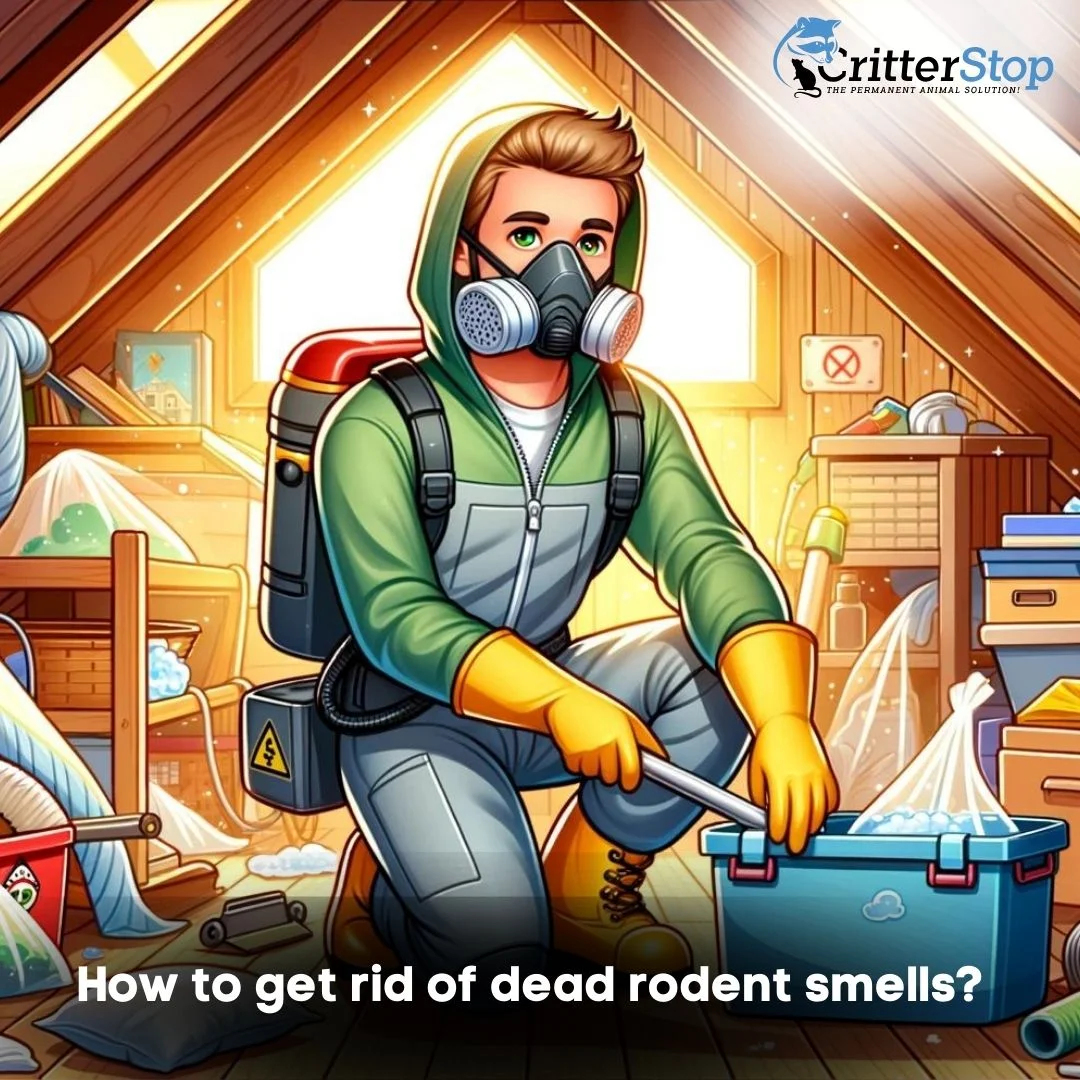
Dead rodent smells can be a real nuisance and a major cause of discomfort in the house. The odor can permeate the entire house, creating a foul smell that can be challenging to eradicate. This stench may persist for weeks or even months. However, there are numerous methods available to eliminate the smell of a deceased rodent in the household.
One of the initial steps is to pinpoint the source of the odor. The scent might emanate from a deceased rodent, although it could also be attributed to another source. Once the source of the odor has been identified, it is important to remove it as soon as possible. This will help to prevent the odor from spreading and becoming more difficult to eliminate. Depending on the whereabouts of the deceased rodent, its removal may necessitate professional assistance.
To eliminate the odor, there are several methods that can be used. One effective way is to use an odor neutralizer. These products function by breaking down the molecules responsible for the odor, effectively eliminating the smell entirely. Another method is to use natural odor eliminators such as baking soda or vinegar. These products are safe and effective, and can be used in combination with other methods to eliminate the odor of a dead rodent in the house.
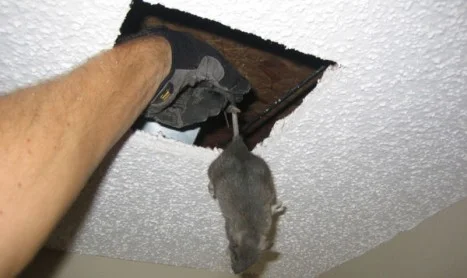
Dead rodent odors are a common issue in homes and buildings, especially during the winter months when rodents seek shelter from the cold. The smell is usually caused by the decomposition of the rodent's body, which releases a strong and unpleasant odor.
Locating the source of the odor can be difficult, as rodents are known for their ability to squeeze into small spaces and hide in hard-to-reach areas. Identifying the location of the carcass promptly is crucial to prevent disease transmission and additional contamination.
When a rodent dies, it can take anywhere from a few days to several weeks for the body to decompose completely. During this time, the odor will continue to intensify and spread throughout the building.
It is important to take proper precautions when handling dead rodents, as they can carry diseases that can be harmful to humans. It's advisable to wear gloves and a mask when handling the carcass and to dispose of it in a sealed plastic bag.
Overall, dead rodent odors are a common issue that can be difficult to deal with. Proper identification and disposal of the corpse is essential to prevent the spread of disease and further contamination.
When a rodent dies in a home or building, the smell can be extremely unpleasant. However, the smell is not just a nuisance; it can also be a health hazard.
The longer the dead rodent is left unattended, the more it will decompose, and the stronger the smell will become. The odor stems from bacteria that feed on the deceased animal, which can generate harmful toxins leading to respiratory problems and other health complications.
In addition to the health concerns, the smell can also be a source of discomfort for those living or working in the building. It can be difficult to concentrate or relax when there is a strong, unpleasant odor in the air.
It is important to locate and source the dead rodent as soon as possible to prevent further decomposition and the spread of bacteria. Once the corpse is found, it should be removed and disposed of properly.
If the rodent died in a hard-to-reach area, it may be necessary to hire a professional to safely remove it. It's equally important to meticulously clean and disinfect the area to eradicate any lingering bacteria and odors.
Overall, addressing the dead rodent smell promptly is crucial for both health concerns and comfort.
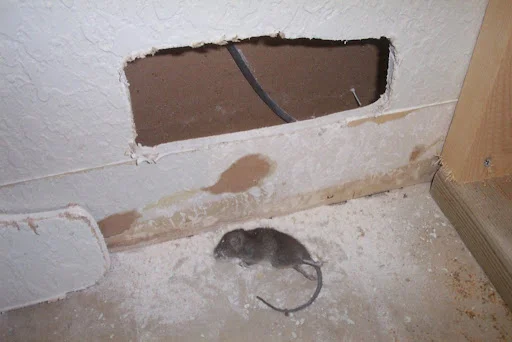
Dead rodent smells can be a challenging problem to identify and eliminate. The following subsections will discuss the signs of a dead rodent presence, the link between rodent infestations and the risks of encountering dead rodents, and the challenge of locating the source of the odor.
The presence of a dead rodent can be identified by the strong, pungent odor it emits. Other signs include the presence of flies or maggots, stains on ceilings or walls, and the sudden disappearance of rodents that were previously seen. It's important to recognize that the odor may persist for several weeks, even after the rodent has been removed.
Rodent infestations increase the likelihood of encountering dead rodents. Rodents can die from natural causes, but they can also be killed by traps or poison. When rodents die, they can be difficult to locate, especially if they die in hard-to-reach areas. It is important to address any rodent infestations promptly to reduce the risk of encountering dead rodents.
Locating the source of the odor can be a challenge. Dead rodents can be found in walls, attics, crawl spaces, and other hard-to-reach areas. It is important to wear gloves and take safety precautions when searching for the source of the odor. Ventilate the area by opening windows and doors to mitigate the intensity of the odor.
In conclusion, identifying the problem of a dead rodent smell requires careful observation and attention to detail. It's crucial to observe safety precautions and utilize suitable equipment when endeavoring to locate and eliminate the source of the odor.
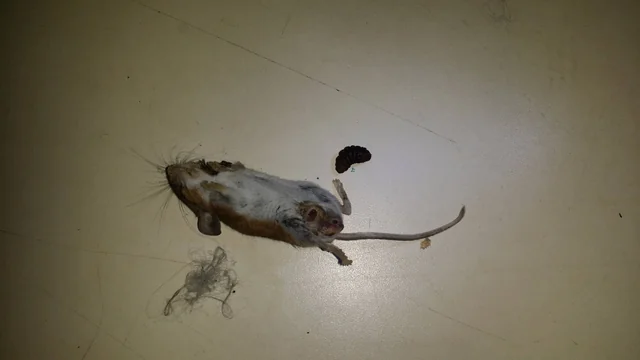
When tackling the unpleasant smell stemming from a deceased rodent, the initial step is to pinpoint the source of the odor. This can be a challenging task, but there are some tips that can help.
The smell of a dead rodent can be strong and unpleasant, making it easy to follow. Start by identifying the areas where the smell is the strongest. Common areas to check include behind walls, under furniture, and in crawl spaces.
It's also important to check areas where rodents may have been living, such as attics, basements, and garages. Look for signs of rodent activity, such as droppings or chewed wires, as these can indicate where the rodent may have died.
When searching for a dead rodent, it's important to take precautions to protect your health. Given that deceased rodents can harbor diseases and parasites, it's crucial to wear gloves and a mask as protective gear when handling the carcass.
Additionally, it's vital to dispose of the carcass correctly. Place it in a plastic bag and seal it securely. Dispose of the bag in an outdoor trash receptacle, and afterward, thoroughly wash your hands.
Wearing protective gloves and masks is essential when handling a dead rodent. Wearing gloves safeguards your hands from direct contact with the carcass, while a mask prevents inhalation of potentially harmful particles.
Selecting gloves of appropriate thickness is crucial to ensure ample protection yet maintain dexterity for handling small objects. Nitrile gloves are recommended due to their strength and flexibility.
In conclusion, locating the dead rodent is an important step in getting rid of the unpleasant smell. By following these tips and taking precautions to protect your health, you can successfully locate and dispose of the carcass.
When removing a dead rodent, it is important to take proper precautions to avoid any health hazards. Here's a step-by-step guide on safely removing a deceased rodent:
Improper disposal of a dead rodent can lead to further health hazards. Here are some proper disposal methods to follow:
After removing the dead rodent, it is important to clean the area where it was found to eliminate any remaining odor. Here's a guide on what to do:
By following these steps, you can safely remove a dead rodent and prevent any further health hazards.
When dealing with dead rodent smells, it is important to thoroughly clean and deodorize the affected area to prevent the smell from lingering. There are diverse approaches to accomplish this, spanning from natural solutions to chemical alternatives.
Natural remedies are a popular choice for those who prefer to avoid harsh chemicals. Vinegar and baking soda are two effective options for neutralizing odors and sanitizing the area. You can create a mixture of vinegar and water to spray onto the affected area, and sprinkle baking soda on carpets and other surfaces before vacuuming them.
For those who prefer chemical options, there are a variety of commercial odor eliminators available. These products function by decomposing the molecules responsible for the odor, effectively neutralizing the scent. Bleach solutions can also be effective, but caution must be taken when using them to avoid damage to surfaces and potential health hazards.
Each cleaning method has its own pros and cons. Natural remedies are typically safer and environmentally friendlier, yet they might not yield the same effectiveness as chemical alternatives. Conversely, chemical options can be more potent, but they carry the risk of being harsh and potentially hazardous if mishandled.
If the contamination is severe, it might be essential to enlist the services of a professional cleaning company to ensure thorough cleaning and deodorization of the area.This is especially important for preventing the spread of disease and ensuring that the area is safe for human habitation.
In general, it's crucial to adopt preventive measures to deter dead rodent odors from occurring initially by maintaining effective pest control practices within the household. However, if the smell is already present, cleaning and deodorizing the affected area is essential for a healthy and pleasant living environment.
Preventing future rodent infestations is crucial to avoid dealing with dead rodent smells again. Below are several prevention tactics that can prove effective:
Sealing entry points is an effective way to prevent rodents from entering your home. Rodents can enter through cracks, holes, and gaps in walls, ceilings, and floors. Use caulking, steel wool, or wire mesh to seal these entry points. Be vigilant around pipes, vents, and utility lines, ensuring they are properly sealed.
Good sanitation practices can help deter rodents from your home. Keep your home clean and free of clutter. Store food in airtight containers and avoid leaving food out overnight. Dispose of garbage regularly and keep garbage cans tightly sealed. Cut back trees and bushes around your home to remove potential hiding spots for rodents.
If you have a recurring rodent problem, consider hiring a professional pest control service for ongoing management. An expert can help identify the source of the problem and provide a long-term solution. They can also provide advice on prevention strategies and help monitor for future infestations.
By implementing these prevention strategies, you can help avoid dealing with dead rodent smells in the future.
To prevent dead rodent smells from lingering in your house, regular inspections are necessary. Check for any signs of rodent activity in your home, such as droppings, gnaw marks, or holes in walls. If you observe any of these indicators, it's essential to act promptly to thwart a potential infestation.
Regular inspections also help to maintain the cleanliness of your home. Make sure to vacuum and clean all areas where rodents may have been present, including attics, basements, and crawl spaces. This will aid in eliminating any lingering debris or odors.
Even after removing a dead rodent, odors may persist. To prevent this, ongoing odor control methods should be implemented. One effective method is to use an odor-neutralizing spray or air freshener. These products help to mask the unpleasant smell and keep your home smelling fresh.
Another efficient approach is to utilize an air purifier. These appliances assist in eliminating airborne particles and odors, thereby enhancing the overall air quality within your household.
Moreover, ensuring adequate ventilation in your residence can aid in diminishing odors. Keep windows and doors open to facilitate the circulation of fresh air within your home. Employ exhaust fans in bathrooms and kitchens to expel any lingering odors.
By adopting these preventative measures and upkeep routines, you can effectively deter the persistence of unpleasant odors from deceased rodents in your home, thus preserving a clean and odor-free living environment.
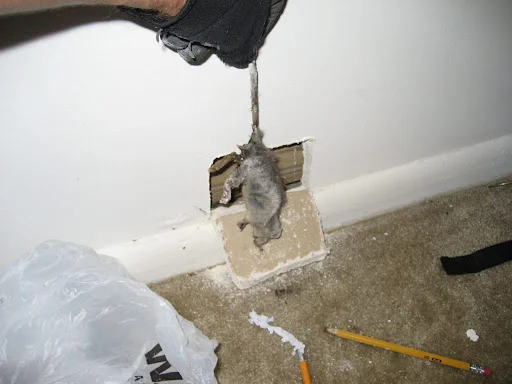
If the smell persists despite trying DIY methods, it might be prudent to consider professional assistance. Here are factors to weigh when determining whether to enlist the help of professional pest control or cleaning services.
When the dead rodent is in a challenging location to access, or if the infestation is severe, it's advisable to engage a professional. Furthermore, if the odor emanates from within a wall or duct, removal without causing damage could be problematic, warranting professional assistance.
Professional pest control or cleaning services can offer a range of services to remove dead rodents and eliminate the associated odor. These may include:
Professional intervention can offer several benefits over DIY methods. Experts possess the necessary skills and tools to identify and eliminate deceased rodents, as well as sterilize the impacted region. Moreover, they utilize appropriate protective attire to ensure safety during the process. Additionally, professional services can help prevent future infestations by sealing entry points and identifying potential problem areas.
There may be instances where it becomes essential to replace damaged materials like insulation or drywall. Professionals are equipped to advise on the most suitable steps to take in such situations.
Overall, if the DIY methods have not been successful in eliminating the dead rodent smell, seeking the help of a professional may be the best option. Professional services encompass a wide range of solutions, including the removal of deceased rodents, odor elimination, and advice on preventing future infestations.
Finding a dead animal in a wall can be a challenging and unpleasant task, but here’s how you can go about it:
If the task seems too daunting or if you cannot locate the animal, consider hiring a professional pest control or wildlife removal service to handle the situation. They have the experience and equipment to resolve the issue quickly and safely.
Eliminating dead rodent odors is crucial for maintaining a healthy and pleasant environment, necessitating prompt and effective action in homes or workplaces. The steps involved include locating the source of the smell, removing the dead rodent, cleaning and disinfecting the area, and addressing any remaining odor with odor neutralizers or air purifiers.
Rodents are carriers of numerous diseases and parasites that pose health risks to humans. Additionally, their presence can induce discomfort and anxiety. Therefore, it is important to address any rodent problems quickly and efficiently to prevent further infestation and potential health risks.
Preventing rodents from entering your environment is crucial. This involves sealing off any possible entry points, securing food sources, and conducting regular cleaning and inspections. If you notice any signs of rodent activity, such as droppings or chew marks, it's important to take immediate action. By following these measures, you can maintain a healthy and comfortable living or working space.
If you're tired or seeking that bad odor without results, it’s time to call the experts. At Critter Stop we have provided our dead rodent odor removal services hundreds of times, helping Dallas Customers to recover their peace of mind. Our expert team after taking care of the removal, cleans and sanitizes all the area around, so you will receive a full complete service. Contact us now at (214) 234-2616 to get rid of your dead rodent problem!
To get rid of dead rodent smell, it is important to locate and remove the source of the odor. Use gloves and a plastic bag to safely dispose of the deceased rodent. After removing the rodent, clean the area with a disinfectant and ventilate the space. You can also try using odor-eliminating sprays or placing odor-absorbing materials like activated charcoal or baking soda in the affected area.
Vinegar can be effective in neutralizing the smell of a deceased animal. Mix equal parts of water and vinegar and use it to clean the affected area. Allow it to sit for a few minutes before wiping it clean. However, vinegar may not be effective in completely eliminating strong odors.
To eliminate dead rodent odor, it is important to remove the source of the odor and clean the affected area thoroughly. Use odor-eliminating sprays or odor-absorbing materials such as activated charcoal or baking soda to neutralize any remaining odors. Ventilate the space to allow fresh air to circulate.
A mouse may begin to emit an odor within a few hours of death. The odor may become stronger as the body begins to decompose. The stages of decomposition include the fresh stage, the bloated stage, the active decay stage, the advanced decay stage, and the dry remains stage.
To remove dead rodent smell, it is important to locate and remove the source of the odor. Use protective gloves and a plastic bag to safely remove the dead rodent. After removing the rodent, clean the area with a disinfectant and ventilate the space. You could also try using air purifiers or placing bowls of vinegar around the area to help neutralize the smell.
To get rid of dead rodent odor, it is important to remove the source of the odor and clean the affected area thoroughly. Use odor-eliminating sprays or odor-absorbing materials such as activated charcoal or baking soda to neutralize any remaining odors. Ventilate the space to allow fresh air to circulate.
Visit our Critter Library and learn more about our furry friends